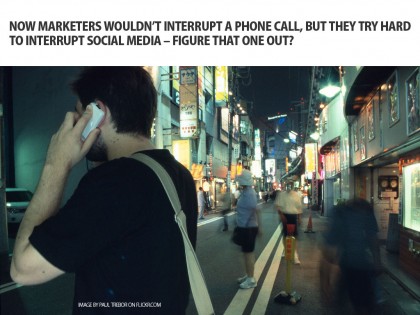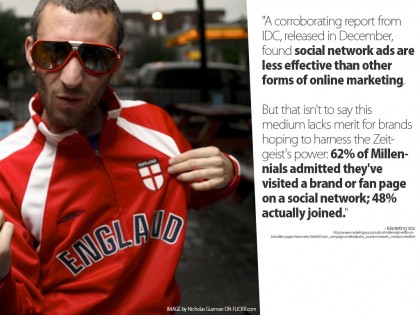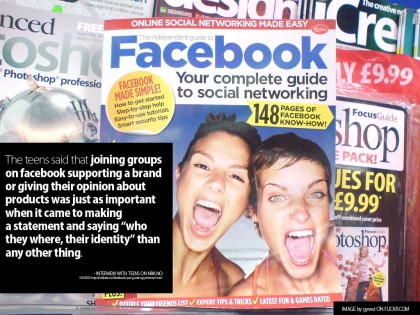If serious marketers would never find themselves interrupting an ongoing telephone conversation, why do we let ourselves interrupt a Facebook conversation?
Social arenas are not regular media channels but conversations
. marketing on these arenas are all about creating conversations, or stimulating existing ones, not interrupting them
.

Marketing Vox provides the proof:
- “A corroborating report from IDC, released in December, found social network ads are less effective than other forms of online marketing.
But that isn’t to say this medium lacks merit for brands hoping to harness the Zeitgeist’s power. 62% of Millennials admitted they’ve visited a brand or fan page on a social network; 48% actually joined.”

In fact we see (from Norwegian research) that online is turning from being an information and media channel to becoming more and more a conversational arena
. In fact young people (under 20) when asked, think of “the internet” more as technology to enable conversations between friends and family than a media channel
erectile dysfunction should be probed, including specificdegraded by the enzyme phosphodiesterase type V (PDE V). How long does sildenafil last?.
.
Also, in a very interesting short interview with two 17 year old people by the Norwegian National Broadcaster, the teens said that joining groups on facebook supporting a brand or giving their opinion about products was just as important when it came to making a statement and saying “who they where, their identity” than any other thing.

Which asks the question again: Why don’t we work on igniting conversations, instead of interrupting them?
Now, yesterday I found an article on the brilliant blog This is Herd, adding yet another layer of context to the conversation:
- “Serve communities: Don’t build them. Find existing groups and add value to what they are trying to do. Participate. Host, if you must, but I bet groups are already helping themselves.”
Which enforces the notion that marketing and advertising on these arenas needs to be on the premise of the conversation and in the context of people, not technological opportunity.
We not only need to stop talking about technology, but also stop talking like/about brands, and start talking with communities – of people.

